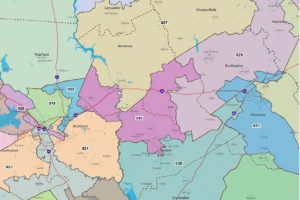By Andy Brack, a news analysis | State lawmakers will be in Columbia today to put final touches on new state House, Senate and congressional maps that will be used for the next 10 years for elections. While the state Senate map has been viewed as pretty good, the maps for House and Congress have been widely panned by observers who say incumbents are just protecting incumbents. Here’s an excerpted version of what we learned last week.
-
Not competitive. The new maps generally aren’t competitive, meaning that it’s predictable who or what party will win before any election is held. “Safe” districts are mostly drawn for Republicans or Democrats, even in areas that could have districts configured so that a Republican, Democrat or third-party candidate could win.
The best congressional example is the proposed First District on the coast where a Democrat, Joe Cunningham, won in 2018, but lost in 2020 to now-U.S. Rep. Nancy Mace, a Republican. The proposed district splits Charleston County and makes it a more Republican district, effectively insulating Mace from a Democratic challenge. “The maps are awful,” Cunningham told the Senate redistricting committee this week. “They make no sense, unless, of course, the sole purpose of these maps is to make it harder for a Republican to lose.” [See video.]
- Little elected input. When one senator asked how many congressmen offered input into the congressional map, a state Senate staffer said only U.S. Reps. Joe Wilson, a Republican, and Jim Clyburn, a Democrat, gave information before it was drafted. S.C. Sen. Margie Bright Matthews, D-Colleton, complained she wasn’t consulted about the congressional map. According to The State, “No members of the S.C. Senate redistricting committee were apparently consulted” either.
- Harms turnout. Cunningham pointed to how the new maps denigrate democracy, instead of promoting it. In testimony, he said he understood why people thought it wasn’t worth voting these days because the results seemed largely predetermined due to the way the maps are drawn. “They have a damn good point,” he said, according to reporting by The State.
- Racial bias. The congressional map, in particular, was criticized for how it used race as a factor. According to The Post and Courier, “District 1 would represent the fewest Black residents of South Carolina’s seven seats, at 68 percent white and 17 percent Black, while the population of [Clyburn’s neighboring] District 6 would fall to just below 50 percent Black.”
- Meaningless “transparency.” While state House and Senate members traveled the state to get public input for mapmaking, Lynn Teague of the League of Women Voters of South Carolina wondered whether the House’s outreach effort was just for show, noting, “if they actually listened to anything said, it wasn’t evident in the resulting map.”
In other recent news:
![]() S.C. has 1,000+ vacant public school teaching positions. A new survey reveals an 88 percent increase in the number of vacant teaching positions across South Carolina. That’s more than 1,000 teacher vacancies that are impacting up to 20,000 students, one organization said. The survey also showed 6,900 educators from last year didn’t return to jobs in their districts, with 18 percent retiring, 34 percent leaving for “external reasons” and 27 percent for “personal reasons.” More: The Post and Courier | WIS TV.
S.C. has 1,000+ vacant public school teaching positions. A new survey reveals an 88 percent increase in the number of vacant teaching positions across South Carolina. That’s more than 1,000 teacher vacancies that are impacting up to 20,000 students, one organization said. The survey also showed 6,900 educators from last year didn’t return to jobs in their districts, with 18 percent retiring, 34 percent leaving for “external reasons” and 27 percent for “personal reasons.” More: The Post and Courier | WIS TV.
Charleston special election to be Jan. 11. Absentee voting begins Dec. 13 to fill the vacant District 1 Charleston City Council seat vacated by Marie Delcioppo, who stepped down. Five candidates are currently running for the seat: Jen Gibson, Boyd Gregg, Shawn Pinkston, David Winkler and Tony Fogle. Read more.
S.C.’s Scott top vice presidential candidate, polls show. Since former President Donald Trump’s defeat in November 2020, speculation has been mounting about South Carolina’s U.S. Sen. Tim Scott’s White House ambitions. More: The Post and Courier.
Greene feuds with S.C.’s Mace on Islamophobia, abortion. U.S. Reps. Nancy Mace, R-S.C, and Marjorie Taylor Greene, R-Georgia, are in a public and highly personal feud over abortion and religion, amid fallout from Islamophobic remarks by some GOP lawmakers. More: The Washington Post | Politico. Related: Mace’s chief of staff resigns.
Former S.C. gubernatorial candidate to pay $33k to end ethics case. Charleston Democrat Phil Noble has agreed to pay more than $30,000 in fines and refunds for violating state ethics laws during his failed bid for governor in 2018.
S.C. Libertarian Party calls another secession for S.C. ‘OK.’ It may not have worked out so well in 1861, but a group of anti-big government South Carolinians says it supports the right of the state and its citizens to secede from the Union in 2021, according to The Post and Courier.
- Want more headlines every business day that are like this? Visit our friends at SC Clips.




 We Can Do Better, South Carolina!
We Can Do Better, South Carolina!
























